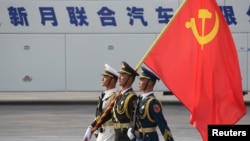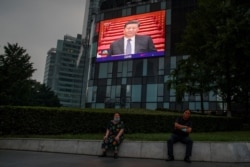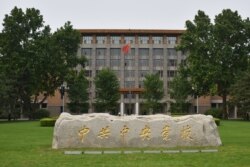A recently expelled Chinese Communist Party insider is speaking out about increasing tensions among high-level officials at a time when Xi Jinping’s hardline policies are bringing Beijing into more conflict with democratic countries.
On Monday, China's Communist Party announced that longtime insider Cai Xia, a former professor at the elite Central Party School, had been expelled from the party and stripped of her pension. Cai Xia had recently spoken in support of another party critic, businessman Ren Zhiqiang, and called China's leader Xi Jinping a "mafia boss."
In an exclusive interview with VOA’s Mandarin service, Cai said that Xi faces widespread opposition inside the party and is doing everything he can to maintain stability from within. That frequently means using a variety of methods to suppress dissent or even differing voices within the party.
“There’s a rule among party leaders. The more pressure it faces externally, the more it fears internal problems,” she said. “Now with great challenges home and abroad, they are trying to silence even the slightest different voices to maintain stability inside the party.”
According to Cai, the core work of the Party since 2019 has been “political safety.” She said that right now in China, “political safety” means that Xi maintains his “safe” place as the Party’s top leader.
Cai’s expulsion appears to have begun in June, when an audio recording of her speaking was leaked online and soon went viral on Chinese social media platforms. The originally private audio recordings were reportedly made at a gathering among “second-generation reds”, where Cai accused Xi of being a “mafia boss” and the CCP of being a “political zombie.” She confirmed with VOA the audio was of her.
Being a “second-generation red” signifies that a person’s parents or grandparents held high-level positions within the party, a legacy that virtually guarantees better access to power and economic benefits than is available to a rank-and-file member.
Monday’s announcement expelling her from the party said Cai has “serious political problems,” and she published comments that “damaged the Party’s reputation.”
As a second-generation red and a former party school professor, Cai held significant stature within the party, and her criticism was widely circulated online. Party insiders rarely speak out publicly against Xi.
The fact that the authorities also seized her pension generated a wave of discussion in Chinese social media networks.
“It’s not surprising for people to see that the CCP expels those who have different opinions,” Cai told VOA Mandarin. “Yet linking political views to your pension and stripping your benefits is like depriving you the right to survive. That shocked the entire Chinese society.”
She added that she plans to appeal the decision and use the law to safeguard her rights, “no matter what the result is.”
Cai is the latest public intellectual punished for criticizing Xi. In July, outspoken law professor Xu Zhangrun was fired from Tsinghua University for publishing articles critical of the Chinese leadership.
A few weeks ago, Ren Zhiqiang, an influential businessman nicknamed “Ren the big cannon” for outspoken attacks on the Communist Party and Xi’s expansion of power, had been expelled from the party and is expected to face criminal charges.
Born in 1952, Cai has long been a Chinese Communist Party insider and also a strong advocate for political liberalization. Cai had studied and taught communist party ideology in China’s Central Party School since 1992.
Established in 1933 and nicknamed “cradle of CCP cadres,” the Central Party School is the higher education institute which trains officials for the Communist Party of China, particularly those with the potential for promotion. In a 2015 school meeting, Xi stressed “all the teaching, research and activities in the Party school have to follow the Party’s political line,” and the school should be “highly consistent with the Party in all of its political and ideology activities.”
Cai, who is not in China, said China is bound to go through political transformation towards democracy, political freedom, rule of law and constitutionalism. She said that for the country to achieve this goal, Xi needs to step down to alleviate what she describes as terror and pressure in the society. At the same time, the party itself needs to be changed.
“The CCP now is a political zombie. I do not think this party can carry out political transformation for the Chinese society,” she said. “The party itself needs to go.”
She added that there are many elites within the party. She urged these elites to get together and create other political parties in the country. “Together, they can carry out a true reform for China and we can see real progress in the society,” she said.
She also said there many party members who hold views similar to hers.
“I don’t think I’m alone,” Cai told VOA Mandarin. “I think 60% to 70% of party members hold the same opinion as I do, but they dare not speak out in fear of retaliation.”
Shih-Wei Chou contributed to this report.









